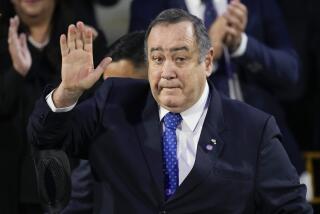An Iron Fist, Extended Harmoniously
In advance of a key Communist Party meeting this weekend, Chinese President Hu Jintao has worked overtime to burnish the image of harmony in the party, even if it’s taken some bloodletting to drive the point home.
The purge late last month of Shanghai party boss Chen Liangyu on corruption charges, quickly followed by the fall of two prominent party officials in Henan province, sent shock waves through China’s political establishment.
The incidents also served as a warning to those in lower party ranks that Hu means business, further consolidating his power and stressing his underdogoriented policies as he heads into the fourth year of an expected 10-year administration.
Hu has stressed the importance of harmony as a salve for growing tensions over China’s rich-poor gap and endemic corruption -- even as the party and the nation’s wide-ranging security apparatus have backed up words with force, intimidation and censorship when appeals for calm are ignored by rioting farmers, the media or social activists.
It comes as no surprise, then, that “harmonious society” will be the theme of this year’s Central Committee meeting, which starts Sunday and runs through Wednesday. About 350 members of the party elite will attend.
Beyond the pageantry and long-winded speeches, the party conference serves an important function in the Chinese political world.
On a stage before China’s 70 million party members and its vast nonparty population, Hu hopes to further demarcate his policies from those of predecessor Jiang Zemin, who placed greater emphasis on economic winners.
The meeting also aims to bind lower-tier state and party workers to the leadership after extensive promotions and government reshuffling. And it will emphasize anti-corruption themes, the environment and the building of a social safety net in a bid to reach out to an increasingly cynical public.
“Hu’s policies will be endorsed more strongly than ever before,” said Cheng Li, a senior fellow at the Brookings Institution and author of “China’s Leaders: The New Generation.” “Moving into his second term, you’ll see more policy initiatives, although probably not much political reform.”
Chinese presidents in recent decades have tended to spend their first five-year term consolidating power and their second making their policy mark. It’s a laborious process, analogous to a U.S. president inheriting his predecessor’s Cabinet and then spending years nudging out the old guard through attrition, transfers, intrigue and strategic use of scandals.
Hu’s recent power plays are in line with this timetable. Chen, a fellow member of the “Shanghai gang,” was an ally of Jiang who in recent years defied Beijing’s call to discourage real estate speculation and stem other policies favoring the well-heeled.
Speculation is rife that other Politburo members with ties to Jiang -- Jia Qinglin and Huang Ju have been mentioned -- may be squeezed out in coming months or, at the least, forced to retire by the Party Congress next fall.
Governing China, with its vast size, complex problems and economic and social turmoil, would challenge any politician, and so far Hu has exceeded generally modest expectations. His identification with the poor and underprivileged plays well, particularly outside the big cities, as does his modesty.
He has avoided major mistakes. And his quiet competence is generally admired by a nation on the move.
Now that he has the power, many analysts are looking closely at what he does with it. Few expect many new ideas during his likely 2007-12 second term, given his relatively cautious, conservative style.
There is likely to be continued emphasis on rural education, welfare issues, unemployment funds and allocation of resources from the richer coastal region to poorer interior areas.
But some see potentially interesting shadow plays in the wings, including gradual moves to strengthen the rule of law and improve human rights. These reflect the concerns of a growing middle class and an awareness of China’s checkered international reputation as it prepares to host the 2008 Olympics.
That contrasts with the dim chances for change in the way China is run, although there may be some tinkering with the relationship between the central and local governments.
“The regime’s institutional changes have so far served to consolidate rather than weaken authoritarianism,” said Andrew Nathan, a political science professor at Columbia University.
To date, attacks on corruption appear selective rather than systemic.
And despite the many problems and contradictions inherent in China’s one-party political system, few analysts expect much progress toward multiparty elections, a robust media, empowered civic watchdogs, an independent court system or external checks on police abuses anytime soon.
If anything, the Communist leadership in recent years has become even more jealous of its monopoly, actively rooting out even the hint of a threat amid suggestions it is running scared.
“Beijing will try to find ways to enhance governability without major changes that it deems unsettling to the regime,” said Xiaobo Lu, a professor of political science at Barnard College and Columbia University.
“By implementing socially and economically harmonious policies,” he added, “the leaders hope to avoid more painful, possibly destabilizing, political changes.”
More to Read
Start your day right
Sign up for Essential California for news, features and recommendations from the L.A. Times and beyond in your inbox six days a week.
You may occasionally receive promotional content from the Los Angeles Times.






